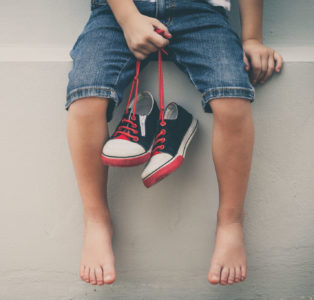 The warm temperatures are here, and that means a lot of people will soon be ditching their closed shoes and going with open-toed options or even going barefoot when they’re out and about. Going barefoot can protect against rashes or infections caused by sweat and wet socks, but you also are more susceptible to cuts and sores. Below, we share some tips for avoiding foot injuries when going barefoot or wearing sandals this summer.
The warm temperatures are here, and that means a lot of people will soon be ditching their closed shoes and going with open-toed options or even going barefoot when they’re out and about. Going barefoot can protect against rashes or infections caused by sweat and wet socks, but you also are more susceptible to cuts and sores. Below, we share some tips for avoiding foot injuries when going barefoot or wearing sandals this summer.
Preventing Against Barefoot Injuries
If you’re wearing sandals or going barefoot outdoors, keep these tips in mind to help keep your feet healthy and injury free.
1. Slippery When Wet – Whether you’re wearing sandals or going barefoot, odds are you won’t have the best traction on wet surfaces. If you’re wearing sandals, find a pair with a good grip, and if you’re going barefoot, don’t run and be careful as you move across wet surfaces.
2. Sun Protection – Most people are good about putting sunscreen on their face, arms and shoulders, but our feet often get overlooked. Be sure to dab the sunscreen on your feet and ankles, and reapply after a couple of hours or if you’re going in and out of the water.
3. Know Your Activity – Once summer hits, a lot of people want to go barefoot as much as possible. However, this may not be the best idea depending on what activities you are going to be performing. If you’re going to be hiking, walking on gravel or running around, a more supportive footwear option will better protect your feet and keep them injury free.
4. Shoe Support – Going barefoot or wearing flimsy sandals don’t offer your feet much arch or heel support. This isn’t the worst in the short-term, but it can lead to conditions like plantar fasciitis or heel bruises if you leave your feet unsupported or unprotected for long stretches. Even though it may be more comfortable, make sure you mix in wearing supportive shoes throughout the summer months.
5. Actively Treat Wounds – If you end up with a cut or a sore on your feet, don’t just assume it will heal on its own. Actively treat the wound, and put a bandage around it if you plan on continuing to go barefoot or wear sandals. If you don’t, dirt and debris can get into the wound and lead to infections or bigger problems.